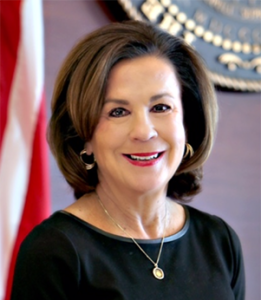Reflections of Missouri Chief Justice Mary R. Russell
Perhaps you are like me in noticing all the “back to school” sales as students from elementary school through college and graduate school prepare for their return to the classroom soon.

But did you know Missouri’s judges also are gearing up to go back to school? All Missouri judges (and lawyers too) are required to have 15 hours of continuing legal education every year, including three hours of ethics training. To ensure judges can meet their continuing legal education requirements, we offer “judicial colleges” to help appellate judges, trial judges, court commissioners and senior judges in their judicial roles.
To minimize any disruption to dockets and litigants, judges can choose between two offerings each year of judicial college – either in in August or November – with the identical courses and speakers, only in different locations. Each judicial college is a four-day event with civil, criminal, domestic relations and evidence updates, as well as professionalism and ethics. The courses are designed by a statewide committee of judges and are taught by experts in each topic, often experienced judges from Missouri. But some classes are taught by judges and other legal experts from around the country.
Although judicial college is the largest education program for judges offered each year, it
is not the only opportunity for judges to learn substantive updates from the last legislative session, recent Supreme Court and court of appeals decisions, as well as best practices for managing cases. All new judges and commissioners are required to attend a weeklong new judge orientation every January. Our circuits’ presiding judges additionally have an educational component of their meetings held every spring and fall. Our appellate judges attend an educational “appellate forum” each June. Further, plenary educational sessions are offered for judges each fall at the annual meeting of the Judicial Conference of Missouri (the state’s organization of judges), which is held in conjunction with the annual meeting of The Missouri Bar (the state’s organization of lawyers).
But that’s not all! Specialized trainings also are available annually for municipal, probate and associate circuit judges as well as an advanced trial skills workshop. One key to the success of judicial education offerings like these is the support of the judicial education staff a at our state courts administrator’s office.
Collectively, there always are a lot of great educational sessions geared specifically for judges every year, to help accommodate all our schedules and areas of focus. This year, I particularly enjoyed learning about artificial intelligence at our appellate forum, and I’m looking forward to upcoming judicial college courses about the impact of AI on discovery and evidence; an updated risk assessment tool to help judges make decisions about pretrial release; and ways to mitigate the vicarious trauma judges may experience from overseeing emotionally charged and sometimes gut-wrenching cases.
So as you or your friends or family members prepare to go back to school this fall, just know Missouri’s judges will be right there too, attending their own judicial college courses.
